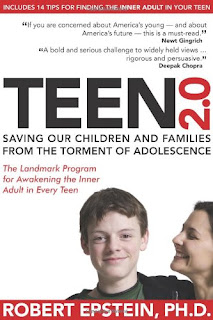Navigating Adolescence
Greetings! It has been a while since I last posted anything here but I am wrapping up a couple of projects that have been taking up most of my time so I hope to begin blogging more regularly in the next few weeks (promises, promises...).
Lately a lot of my reading and reflection has taken place at the intersection of pastoral care, faith formation, and adolescent development. Although I have been doing youth ministry for about seven years, I have never given enough of my time to thinking about how the idea of "adolescence" affects my ministry and how I do faith formation. What I mean is that while I understand that young people think and process things differently from adults, I have not given enough thought to the effects of the cultural category of adolescence on the emotional and spiritual lives of teenagers.
Enter Dr. Robert Epstein. I first encountered Dr. Epstien's ideas in 2011 at the National Youth Workers' Convention in Atlanta. Epstein is a research psychologist educated at Harvard and former editor-in-chief of Psychology Today. The area of his work that interests me is his research regarding adolescence. I just ordered and have read the first chapter of Teen 2.0 and I am fairly certain that it is going to rock my world completely. His basic contention seems to be that adolescence is an entirely unnecessary and even harmful societal invention. Young people, he argues, do not have too much freedom, but too little. Young people are not inherently irresponsible or incompetent but are, in many cases, just as if not more competent and capable of responsible behavior than their older adult counterparts. In Teen 2.0, it appears that Dr. Epstein is arguing for a full-scale, society-wide dismantling of systems that delay the transition from childhood to adulthood. And so far, I think I agree with him.
I cannot count the number of times I have encountered behavioral problems in the young people with whom I serve that could - in large measure - be attributed to the infantilization of teenagers and the unwillingness of adults to help them seize opportunities to be competent, responsible young adults. I am thoroughly looking forward to reading through Epstein's 500 + page tome on adolescence and I want to use this space to reflect on the implications of his research for youth and family ministry. So, starting this week, I plan to write a post each week (schedule allowing) reflecting on Dr. Epstein's work and I hope you'll join me in this journey.
Of course, I want to balance Dr. Epstein's work with perspectives from other researchers in this field - especially those whose work has clear implications for ministry with young people and their families. Along with Teen 2.0, I plan to have on hand the updated version of Chap Clark's book, Hurt as well as Soul Searching by Christian Smith, Almost Christian by Kenda Dean, and Sticky Faith by Kara Powell and Chap Clark. Are there other voices you would recommend?
Purchase Teen 2.0 at Amazon.com or, better yet, at Better World Books.
Purchase Teen 2.0 at Amazon.com or, better yet, at Better World Books.

I would suggest also looking at the book by Jeffrey Arnett, "Emerging Adulthood" for a contrasting perspective. I think both he and Epstein have elements that we need to recover for adolescents, although they come at it from contrasting viewpoints.
ReplyDeleteI'll definitely check out Arnett's book. Thanks for your comment! Looking forward to further conversation!
ReplyDelete